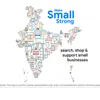
Google India
View Brand PublisherThese foodpreneurs are converting your favourite restaurants into cloud kitchens to serve you better
The Indian restaurant industry has probably been one of the worst-hit sectors due to the COVID-19 pandemic, with their revenues affected by a double whammy of the lockdown-led closure of dine-ins and a drastic drop in customer footfalls even after these restrictions were eased.
But innovators and risk-takers have pivoted to cloud kitchens to revive, sustain and boost growth in the sector, without compromising on their core goal — serving top-notch food to customers. As the government eased restrictions, the popularity of cloud kitchens went up as loyal patrons craved for restaurant-quality food in the safety of their homes and with minimal contact with the outside world.
Customer is kingmaker
Restaurants thrive on loyal patronage, and several foodpreneurs are focused on this element while changing the nature of their restaurant business. These foodpreneurs are turning to the cloud kitchen format to continue serving patrons.
In June 2020, Food and beverage retail company Lite Bite Foods, that runs various casual and fine-dine restaurant formats, announced plans to open over 35 cloud kitchens in five cities as uncertainties continued to loom over the industry. The first kitchen opened in New Delhi in August as LBF Cloud Kitchens. Cloud kitchens are purpose-built kitchens used to prepare food specifically for food delivery through apps such as , and others.
In fact, LBF also has plans to launch its own food app 'FOOGO', which will allow consumers to order food from across the company's food formats.
Similarly, Uru, a popular brewpark in Bengaluru’s JP Nagar, converted its 1.5-acre space to launch four kitchens - Great Walk (pan-Asian), Handmade (Italian), Roohi (Indian) and Let’s Get Started (appetisers). That Curry Place, a new cloud kitchen venture by 1Q1 Restaurant on Queens Road in Bengaluru, has been bringing curries from around the world to customers’ homes.
“We realised that the crowds were not going to come back any time soon. And yet, we were constantly fielding queries from our customers on when we will reopen,” Rohan Beliappa, director of Bengaluru’s popular Windsor Pub, says.
One of the city’s oldest pubs, the watering hole was shut down a few years ago, but it still evokes much emotion and fond memories for the city-dwellers with their signature pork fry, malabar-style prawns, rolls and other pub grub.
In May 2020, Rohan launched Windsor Food Factory, a cloud kitchen that brought the flavours of the erstwhile pub to people’s homes. “Thanks to the loyal patronage of our customers, we came back with a bang with Windsor Food Factory within the CCI-Arte Boutique hotel in Wilson Garden,” Rohan says. He adds that the rebranded pub continues to offer its most popular dishes and fulfils 35 to 50 orders per day, ensuring safety and hygiene.
How you can help
All these restaurants, and several other players in the cloud kitchens space, believe customers can make or break the restaurant business.
“We need customer patronage and loyalty, and word of mouth is the best way to promote your favourite restaurant. There is so much that customers can do for us, apart from ordering in,” according to Windsor Food Factory’s Rohan.
It can be as simple as leaving a good review online or promoting it within your social circles. Community-led efforts are also a great way to ensure that small businesses survive and thrive in these difficult times.
A testament to these efforts is the fact that ordering-in from restaurants has almost reached pre-pandemic levels. Restaurant aggregator and food delivery giant Zomato, in its mid-COVID-19 report, highlights how more customers are ordering in. The food delivery industry is recovering swiftly with gross merchandise levels crossing 85 percent of pre-COVID-19 levels from 75 percent in August.
Metros such as Delhi and Mumbai are nearing a full recovery at 95 percent orders of pre-COVID-19 levels, while Bengaluru, Hyderabad and Chennai are around 80 percent orders of pre-COVID-19 levels.
This underscores the huge importance of customers in turning around small and local businesses, especially in tough environments. To double down on its efforts to push customers in this direction Google India has launched the ‘Make Small Initiative’.
Know more about the initiative here.








